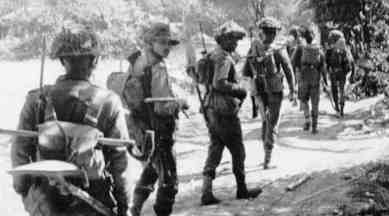Stay updated with the latest - Click here to follow us on Instagram
Bangladesh@50 Book excerpt: Portraits of Courage
🔴 For a commander who raised, trained and led into battle the SFF, comprising mainly an intrepid group of Tibetan fighters, Major General Sujan Singh Uban (Retd) was not quite your typical military man of action.

Lance Naik Albert Ekka
As a child growing up in the village of Jari in what is now Jharkhand, Albert Ekka became adept at the traditional skills of the Oraon tribal community to which he belonged. He grew into an expert marksman with the bow and arrow, and he learnt to move stealthily through the jungles near his home as he tracked deer, quail or hare…. In December 1962, at the age of twenty, physically superbly fit and with a spirit of adventure hungering for bigger challenges, he joined the Bihar regiment of the Indian Army, later transferring to the 14 Battalion of the Brigade of Guards. Just nine years later, on December 3, 1971, his heroism in battle at Gangasagar, East Pakistan, would silence Pakistani guns, save the lives of dozens of his fellow soldiers and enable the Indian Army to take control of the strategically crucial junction at Gangasagar. At the end of the battle – one of the bloodiest battles of the 1971 war, fought in hand-to-hand combat – the gravely wounded soldier died on the battlefield. Lance Naik Ekka was the only jawan (non-commissioned officer) awarded the Param Vir Chakra in the 1971 war. He was also the only one to be awarded the Param Vir Chakra in the eastern sector in that war.
MUST READ | Bangladesh@50: A timeline of the 1971 Liberation War, as it unfolded
monthly limit of free stories.
with an Express account.
One of the primary tasks given to Ekka’s battalion, right at the onset of the official hostilities on December 3, 1971, was the capture of Pakistan Army positions at Gangasagar in East Pakistan’s Brahmanbaria district, just 7 km from Agartala. This was crucial for the 4 Corps’ advance towards Akhaura, which would then clear their way towards the capital of East Pakistan, Dhaka. Gangasagar was a major railway junction…
A detailed account of the battle at Gangasagar written by Col V. Ganapathy (Retd), a senior fellow at the Centre for Land Warfare Studies (CLAWS), recounts that the Pakistani defences were mainly based on the high ground around the railway station and the built-up areas near it…
Juggernaut/160 pages
`261
Major General Sujan Singh Uban
For a commander who raised, trained and led into battle the Special Frontier Force (SFF), comprising mainly an intrepid group of Tibetan fighters, Major General Sujan Singh Uban (Retd) was not quite your typical military man of action. A deeply spiritual person, Uban was drawn towards mystics and religious leaders, seeking answers to the deeper meaning of life and the afterlife…
Termed as the ‘Fifth Army’,1 the SFF not only kept a flank of Lieutenant General Sagat Singh’s 4 Corps secure but also managed to cut away a vital retreat route into the jungles of Burma (now Myanmar) for the Pakistan Army, encircling and preventing the escape of Pakistan’s 97 Brigade and 2 Commando Battalion, who were taken prisoner at the end of the war.
As all this was happening, Maj Gen Uban was also busy training Bangladeshi volunteers to take on the Pakistan Army in guerrilla warfare. The men of the Mujib Bahini (named after Bangladeshi leader Sheikh Mujibur Rehman) were given extensive training under SFF leadership, and together with the Mukti Bahini they wreaked havoc on the Pakistan Army behind their lines, seriously affecting their fighting prowess against the advancing Indian Army forces.
Man Aman Singh Chhina is an assistant editor with The Indian Express. Seven Heroes of 1971: Stories of Courage and Sacrifice will be out this month